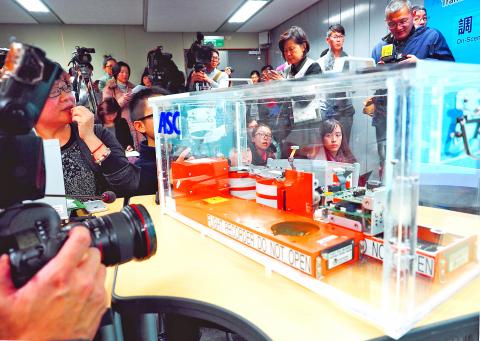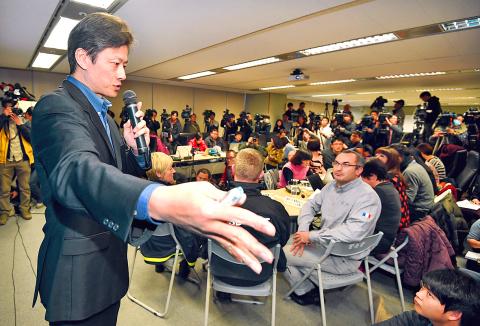The Aviation Safety Council yesterday revealed preliminary information from the flight data recorder (FDR) and cockpit voice recorder of the crashed TransAsia Airways Flight GE235, showing that the pilots may have mistakenly turned off the engine that could have kept it airborne.
Council executive director Thomas Wang (王興中) said that the master warning for the No. 2 engine was triggered about 37 seconds after takeoff, which indicated that the engine had flamed out. During that time, the airplane was flying at an altitude of 457m, he said.
Wang also said that the propellers of the No. 2 engine went into the feathered mode after the flame-out signal. The auto-feather system is activated when the power of the engine becomes insufficient to produce the thrust, he said, adding that the system helps reduce drag during an engine failure.

Photo: EPA
“Even though the flame-out alarm went off, the engine did not actually flame out and was still running,” Wang said, adding that the aircraft’s dashboard should have informed the pilot that it was the No. 2 engine that had malfunctioned.
Despite the problem with the No. 2 engine, Wang said that the flight crew did not shut it down, but decided to increase its throttle.
Wang said that although there was no sign of abnormality with the No. 1 engine, the flight crew manually turned it off when the airplane climbed to 488m, leading that engine to go into feathered mode as well.

Photo: Liao Chen-hui, Taipei Times
The flight crew later tried to restart the No. 1 engine, but did not have enough time to power the engine back into full operation, Wang said.
The data further showed that the aircraft had sounded a stall warning five times before the FDR stopped recording.
After the third stall warning, the flight crew contacted the control tower and called out: “Mayday, Mayday, engine flame-out.”
The council also showed the data plot from the FDR of the engines, which indicated that both engines had operated normally before the No. 2 engine went into feathered mode.
As to what led to the failure of the No. 2 engine and why the flight crew decided to turn off the No. 1 engine following a brief discussion, Wang said that these questions could only be answered after further investigation.
Previously, media reports had speculated that the problem could be with the No. 1 engine, as the company had replaced it twice since it acquired the aircraft from the French manufacturer.
Yann Torres, a representative from the French Bureau of Enquiry and Analysis for Civil Aviation, also attended the press conference and confirmed that the ATR 72-600 airplanes are able to operate with one engine, even during take-off.
Meanwhile, the Civil Aeronautics Administration (CAA) said that all pilots operating ATR 72 models are to be retrained.
Clark Lin (林俊良), director of the administration’s flight standards division, said that the airline has 71 pilots trained to fly ATR 72 planes, adding that they would be required to take an oral test on operating the aircraft.
The test would be administered over four days, beginning today, he said.
Lin said that pilots could still fly the airplanes before they take the test, because they are qualified pilots.
However, they must finish the test within four days and would be asked to be requalified as pilots if they fail the test, Lin said.
The pilots would later be asked to operate a flight simulator as well.
CAA statistics showed that of five TransAsia Airways incidents between 2010 and last year that involved problems with an engine, two of them were attributed to human error.

A Ministry of Foreign Affairs official yesterday said that a delegation that visited China for an APEC meeting did not receive any kind of treatment that downgraded Taiwan’s sovereignty. Department of International Organizations Director-General Jonathan Sun (孫儉元) said that he and a group of ministry officials visited Shenzhen, China, to attend the APEC Informal Senior Officials’ Meeting last month. The trip went “smoothly and safely” for all Taiwanese delegates, as the Chinese side arranged the trip in accordance with long-standing practices, Sun said at the ministry’s weekly briefing. The Taiwanese group did not encounter any political suppression, he said. Sun made the remarks when

The Taiwanese passport ranked 33rd in a global listing of passports by convenience this month, rising three places from last month’s ranking, but matching its position in January last year. The Henley Passport Index, an international ranking of passports by the number of designations its holder can travel to without a visa, showed that the Taiwan passport enables holders to travel to 139 countries and territories without a visa. Singapore’s passport was ranked the most powerful with visa-free access to 192 destinations out of 227, according to the index published on Tuesday by UK-based migration investment consultancy firm Henley and Partners. Japan’s and

BROAD AGREEMENT: The two are nearing a trade deal to reduce Taiwan’s tariff to 15% and a commitment for TSMC to build five more fabs, a ‘New York Times’ report said Taiwan and the US have reached a broad consensus on a trade deal, the Executive Yuan’s Office of Trade Negotiations said yesterday, after a report said that Washington is set to reduce Taiwan’s tariff rate to 15 percent. The New York Times on Monday reported that the two nations are nearing a trade deal to reduce Taiwan’s tariff rate to 15 percent and commit Taiwan Semiconductor Manufacturing Co (TSMC, 台積電) to building at least five more facilities in the US. “The agreement, which has been under negotiation for months, is being legally scrubbed and could be announced this month,” the paper said,

MIXED SOURCING: While Taiwan is expanding domestic production, it also sources munitions overseas, as some, like M855 rounds, are cheaper than locally made ones Taiwan and the US plan to jointly produce 155mm artillery shells, as the munition is in high demand due to the Ukraine-Russia war and should be useful in Taiwan’s self-defense, Armaments Bureau Director-General Lieutenant General Lin Wen-hsiang (林文祥) told lawmakers in Taipei yesterday. Lin was responding to questions about Taiwan’s partnership with allies in producing munitions at a meeting of the legislature’s Foreign Affairs and National Defense Committee. Given the intense demand for 155mm artillery shells in Ukraine’s defense against the Russian invasion, and in light of Taiwan’s own defensive needs, Taipei and Washington plan to jointly produce 155mm shells, said Lin,